Continuing the occasional series about notable Apple Stores, AppleInsider visits Apple Birmingham in England to see a gorgeous example of the company's preservation of architectural history.
Apple has occupied the New Street, Birmingham building since 2016, but it was first constructed in 1879. Back then, it was the imposing offices of the Midland Bank, with an opulent, open, huge banking space.
Subsequent owners cut that space down and filled it up with retail shelves, but Apple was keen to restore it. According to plans seen at the time by local newspaper the Birmingham Evening Mail, the architects were specific about returning the space to what it once was.
"It is our intention to reinstate the space back to the single generous volume and character when used as a banking hall by Midland Bank," the plans state. "Retail trading will be confined to the ground and lower ground floor level, to impose on the public's experience of the space as originally intended when used as a banking hall."
Birmingham New Street
Even few local residents know this, but where Apple Birmingham sits is strictly speaking called the Queen's Corner. That name is written in stone high up on one of the other buildings at the crossroads where New Street and Corporation Street meet.
Corporation Street then immediately becomes Navigation Street as it, and its new tramlines, go down and behind Apple Birmingham to reach Birmingham New Street Station. That's one of the country's busiest rail stations and yet New Street itself has been through many years of declining footfall, brought on by the construction of the Bullring shopping center at another end of the street.
When that was new in 2003, it so sucked the life out of New Street and High Street that more people wondered whether it was properly spelt "Bullring" or "Bull Ring" than went to the old shops.
Apple played its part in that, too, as in 2005, Apple Bullring opened inside the shopping center. This store was broadly modelled on the original US ones, in a space that was narrow, if quite long.
It was also a double-height store, but only the one floor was used for retail. The rest may have included support and repair spaces, but it was all fronted by a large, glowing Apple logo.
This store occupied its 4,000 square feet until the day Apple opened its Apple Birmingham store on New Street — with 20,000 square feet.
For many months, the Bullring was unable to fill the space Apple left. So for that time, instead of the small store's glass doors, the space was boarded up and Apple displayed a note.
"We would never leave you," it began, before directing people to its new store.
Exterior Bank, Interior Bookshop
Records are spotty about how often the Midland Bank building changed hands, but ask a local and they will tell you it went from the Bank, to Waterstones' Bookshop, and now to Apple. It's possible there were briefly some other bookshops there, though.
It's really Waterstone's that turned the bank into a retail space, however, and, for majority of Birmingham residents and visitors, provided their first look into the building.
Waterstone's took over in the 1990s and one estimate was that its shelves held 100,000 books. Those shelves were spread over five floors plus a split-level basement and if that wasn't enough, there was a second Waterstone's store just by the Bullring.
That other store remains open and busy to this day, but the huge one in the bank building is missed.
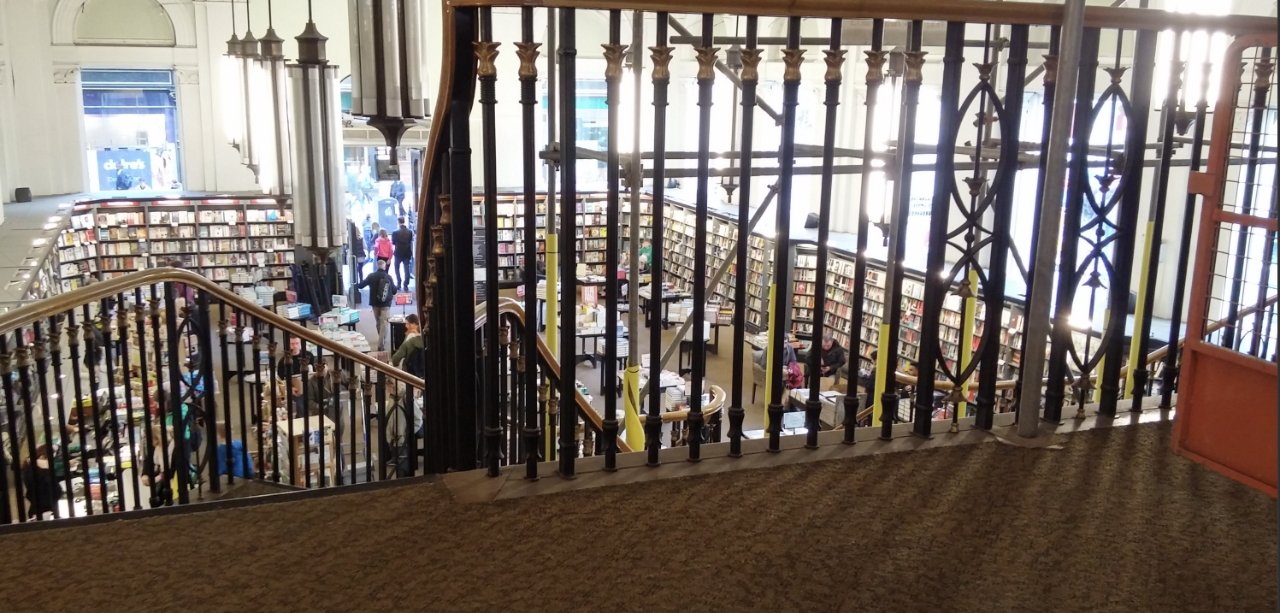 How it used to be. View from the stairs in Waterstones' Bookshop, shortly before its closure in 2015. (Source:Flickr)
How it used to be. View from the stairs in Waterstones' Bookshop, shortly before its closure in 2015. (Source:Flickr)Or rather, its cavernous size and its wide range of books are missed. There is one thing about the bookstore that Waterstone's management said they couldn't do anything about — but Apple did immediately.
A huge portion of the main hall used to be taken up with long, wide, sweeping and decidedly steep steps up to the next level. Once you got above a certain height on the stairs, though, you could see the tops of the shelf units ranged around the floor.
Compared to the very neat front and sides, those tops of the shelf units were supremely dusty and looked even unpleasantly dirty.
Once Waterstone's closed the store, though, and Apple bought up the empty space, those shelves were completely removed. So was the stair case.
Today, then, Birmingham residents used to wandering more than five levels now walk in to what appears to be just one.
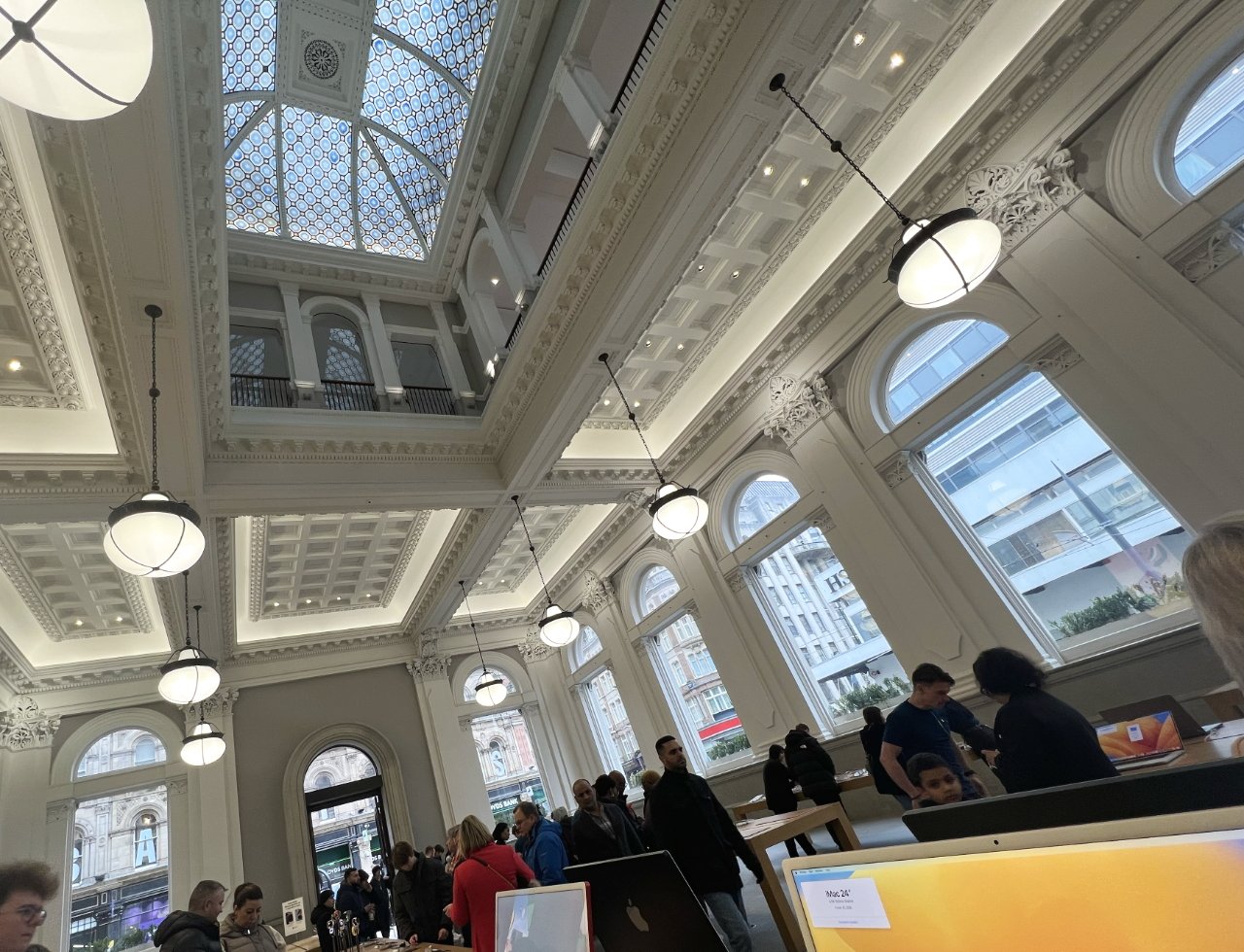 On a dark day, those chandeliers are needed, but the enormous windows make it all feel very light and airy
On a dark day, those chandeliers are needed, but the enormous windows make it all feel very light and airyBusy, open space
When AppleInsider visited on a Sunday afternoon in early March 2023, the roof of the main entrance looked like a cathedral. And the floor looked packed.
Some 80 customers were being helped by around 15 staff. On a cloudy day, the interior of the space was bright and welcoming.
There are a series of ornate chandeliers that were lit, but light also came from nine enormous windows. Ranged around two walls, the nine start just above head height, then extend almost up to the extra high ceiling.
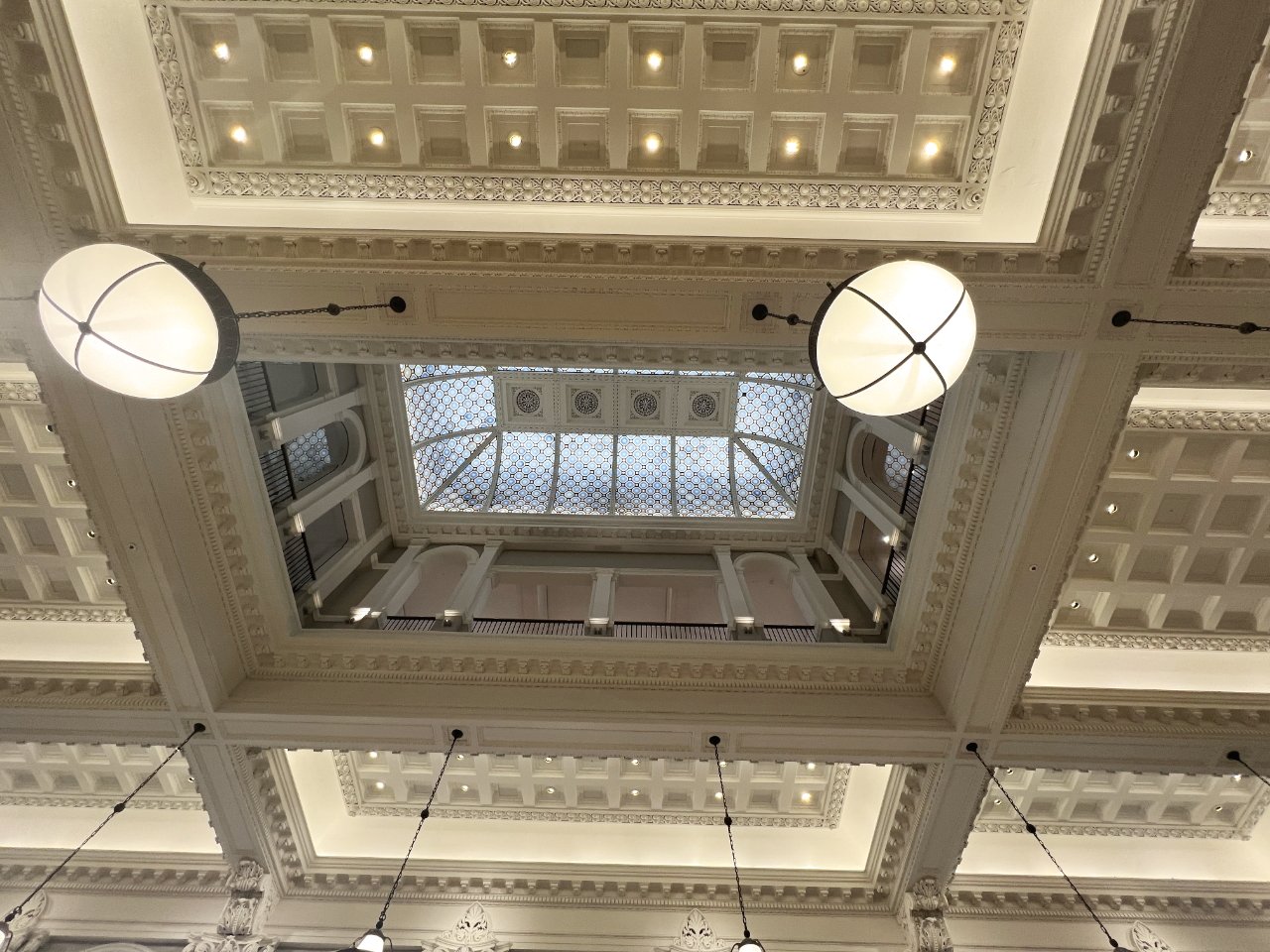 You could see this original skylight when this was a bookshop, but Apple has made it more of a feature
You could see this original skylight when this was a bookshop, but Apple has made it more of a featureFrom the center of the retail floor, you can also see all the way up to the top of the building and what appears to be a carefully restored, and definitely elaborate, skylight.
Basement area
While it initially looks like Apple is occupying only the ground floor, it's noticeable that there are no shelves on the walls. This space is entirely given over to tables with products on, and the walls that do not have huge glass windows, do instead have huge Apple posters.
That's because all of the accessories that are typically displayed on wall shelves are in an almost hidden basement area. The entrance to it consists of gray stone stairs that are wide and open, but because it is right at the back of the store, it's easy to miss until you walk up to it.
If you then walk down the stone stairs into the basement, you come to a much smaller, much darker area. It probably extends about a fifth of the same length of the main retail floor, but it seems narrower.
It's also interrupted by four large pillars, which roughly divide the space into areas for different products. The shelves contain the usual array of accessories, and they surround a series of tables.
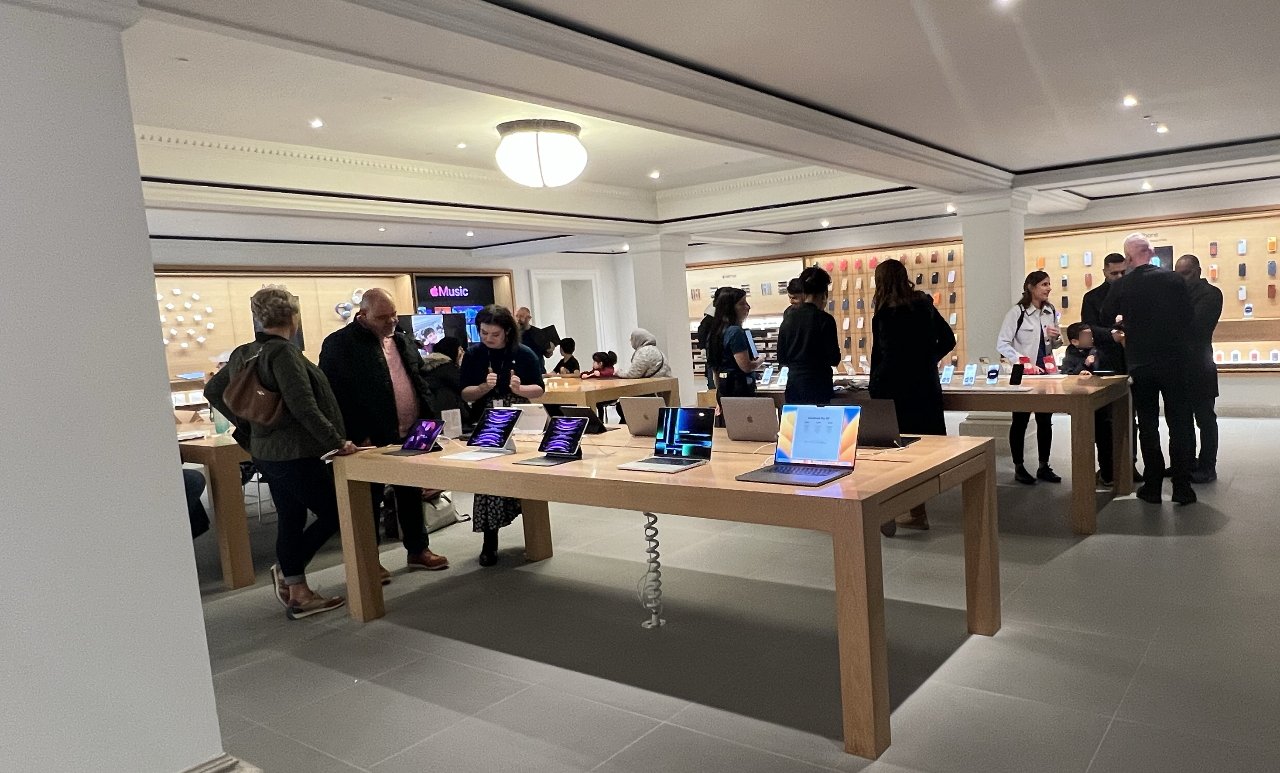 It doesn't quite show in the photographs, but the basement area is subtly darker than the main floor
It doesn't quite show in the photographs, but the basement area is subtly darker than the main floorMost of those tables are displaying much the same lineup of MacBook Pro and iPad models as the main space, but this is also where Today at Apple happens.
Compared to stores like London's Brompton Road one, the Today at Apple space is tiny. It's really a single store table with a movable monitor at one end.
While AppleInsider was there, an Apple Genius was leading a Today at Apple session about using Procreate on the iPad. While small, the space was full, and there were iPads, each with an Apple Pencil, to spare.
It's definitely a disadvantage that this area is so small, but the overall feel is welcoming, even cosy. It was also busy with around 30 customers were working with about 9 staff, and the slight darkness made all of the screens seem brighter.
Outside the store
New Street Birmingham is typical of many English cities in that at eye-level, everything is modern and new, with every storefront made of glass. But lift your head just a fraction, and almost every building clearly dates back at least decades.
That's every building except Apple's. Apple Birmingham looks its age, in every good sense of that phrase, standing there as if designed in the 1800s but so clean and fresh that it looks built today.
The street has yet to quite regain its position as Birmingham's busiest, since the Bullring took customer footfall and COVID made an impact. But it is regaining it, and every December, the whole run from the shopping center and past Apple to the Birmingham Town Hall is lined with stalls for the Christmas market.
As with so many of Apple's stores, Apple Birmingham is unique — even within the UK. Compare it to the newest store, Apple Brompton Road in London, and to the radically different Marina Bay Sands store in Singapore.
 William Gallagher
William Gallagher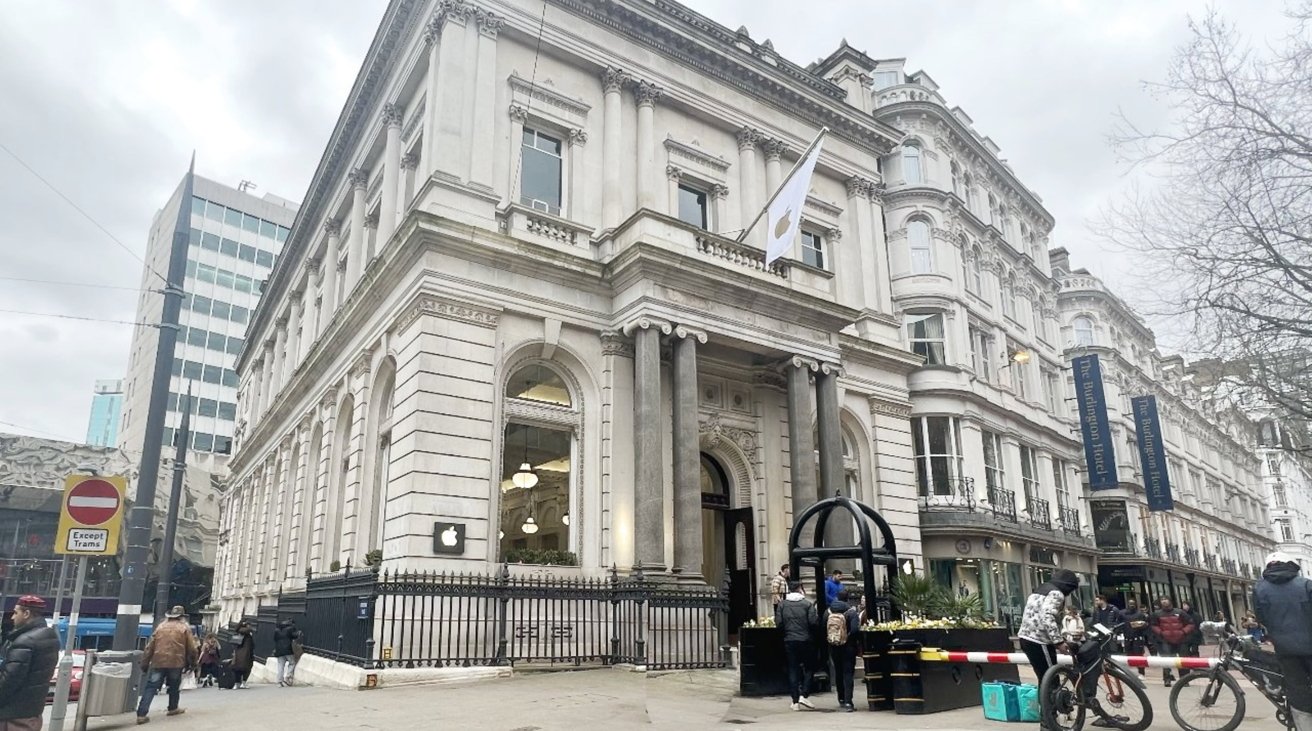
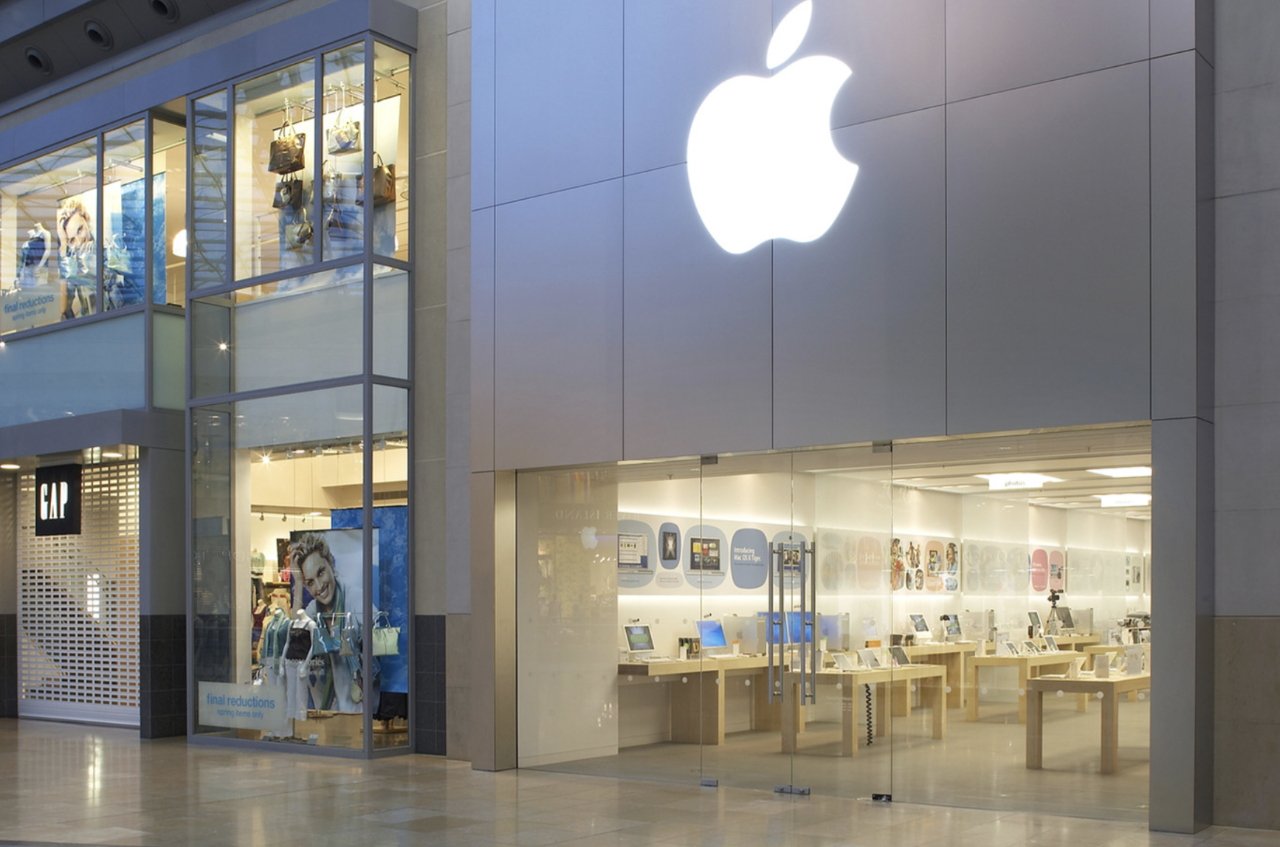
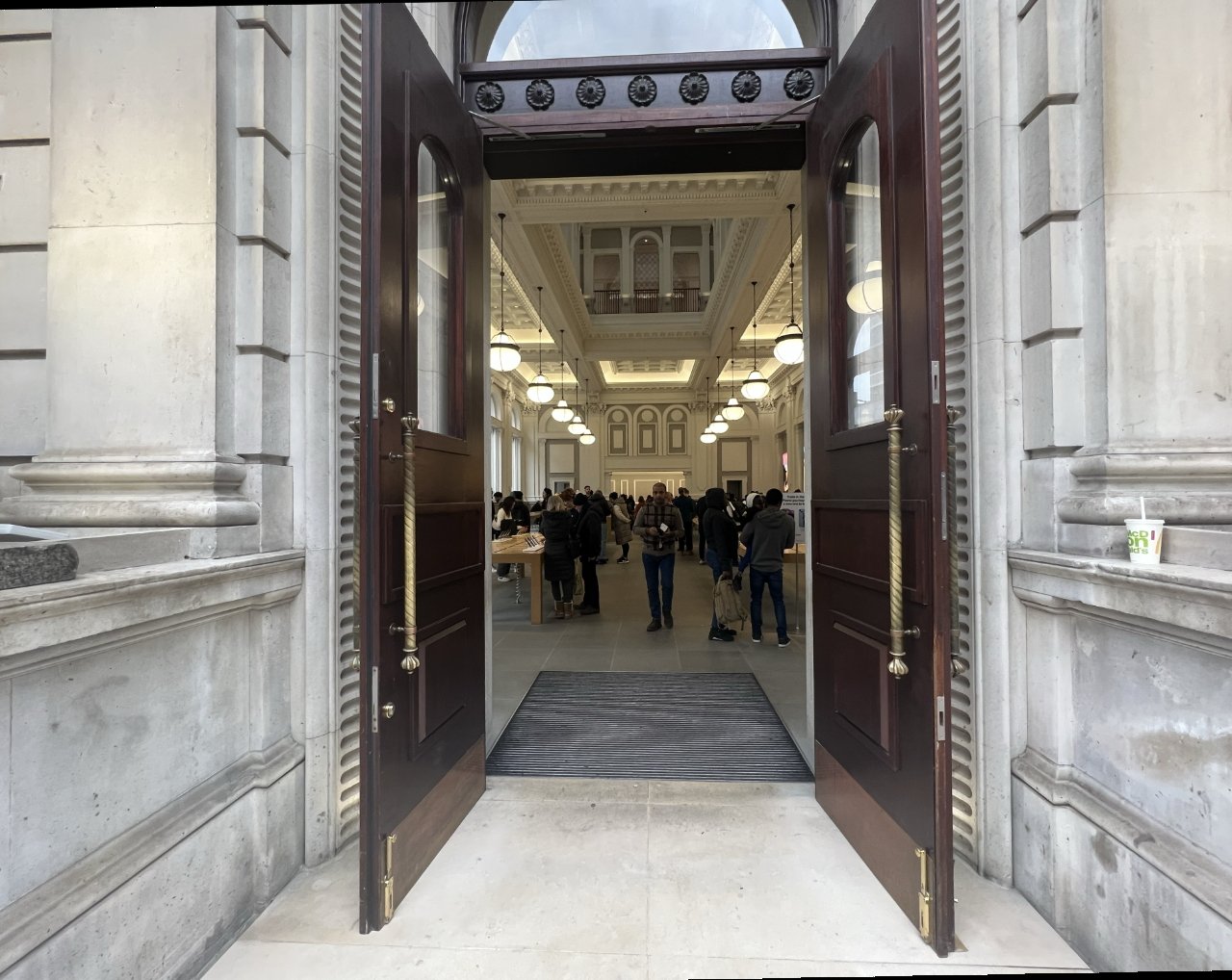
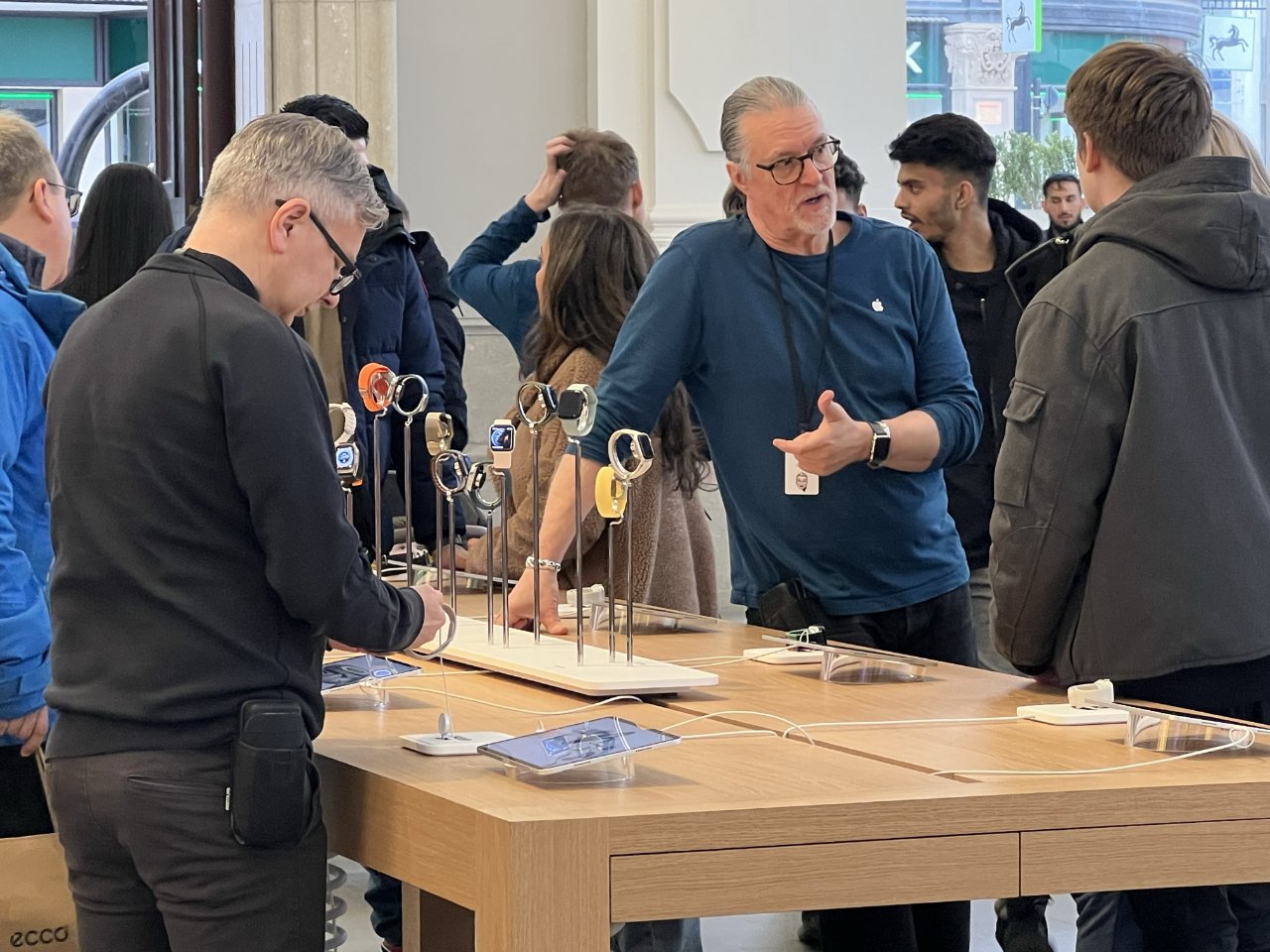
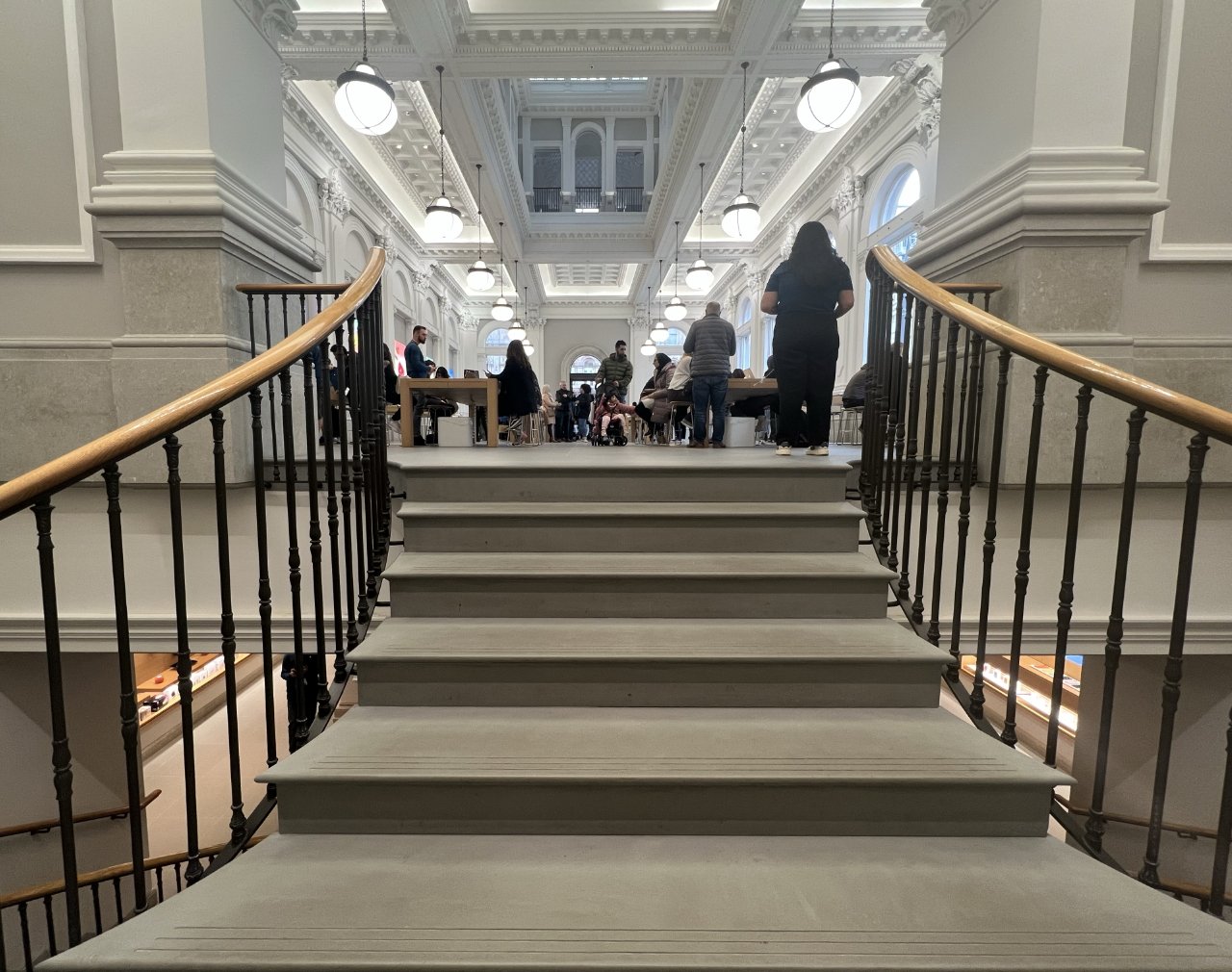
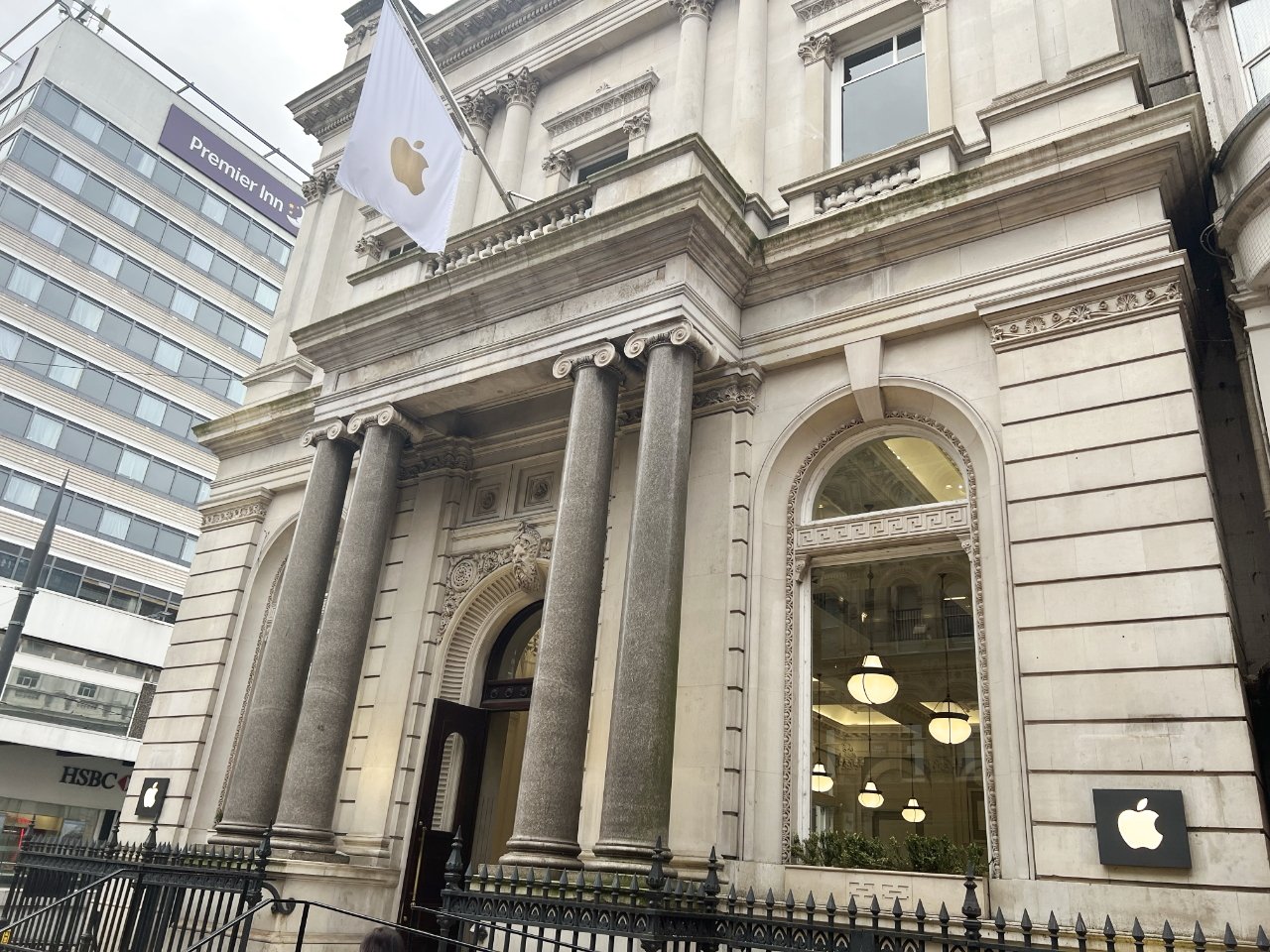







-m.jpg)






 Christine McKee
Christine McKee
 Charles Martin
Charles Martin
 Mike Wuerthele
Mike Wuerthele
 Marko Zivkovic
Marko Zivkovic
 Malcolm Owen
Malcolm Owen




-m.jpg)






8 Comments
I really respect Apple for restoring these heritage buildings so they look fresh yet within an Apple Store aesthetic.
This is from Apple. From another angle.
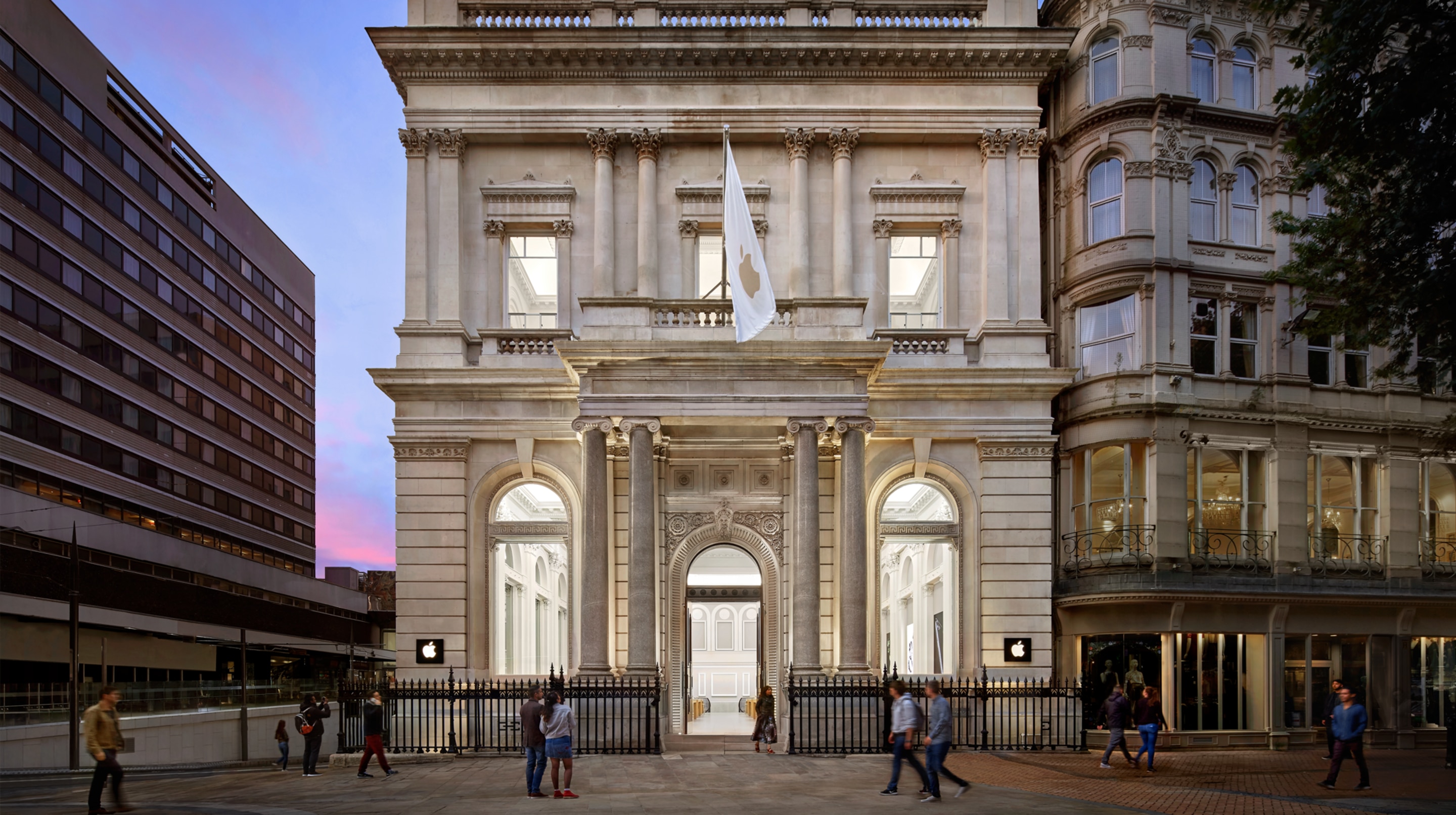
Went in there a couple years ago. Really nice store. Took a while to find it as the logo's did not stand out and was expecting the usual frontage.
I remember the old store well, I am pretty sure it was the third international store outside the USA (after Tokyo and London) it was also one of only a very small few that were 27 feet wide. The store would see over a million people per year which was just incredible! It’s likely it was the most profitable Apple Store in the world per sq foot (at one stage). Always an amazing place to be!